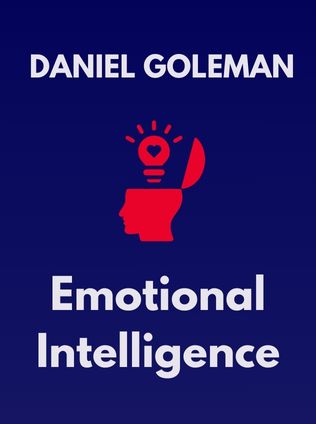
Emotional Intelligence
Why It Can Matter More Than IQ
By Daniel Goleman
Published 01/1995
About the Author
Daniel Goleman is a renowned psychologist and science journalist who introduced the concept of Emotional Intelligence (EI) to a wide audience through his groundbreaking book, "Emotional Intelligence," published in 1995. Goleman has a Ph.D. in psychology from Harvard University and has written extensively on topics related to psychology, brain science, and leadership. His work emphasizes the importance of EI in personal and professional success, arguing that it can be more critical than IQ.
Main Idea
"Emotional Intelligence" explores the role of emotions in shaping our thoughts and actions and argues that emotional intelligence, which includes self-awareness, self-regulation, motivation, empathy, and social skills, is a key determinant of success in life. Goleman contends that while IQ contributes to only 20% of success, emotional intelligence makes up the remaining 80%, underscoring its vital importance.
Table of Contents
- Introduction
- Emotions: What Are They?
- The Science Behind Emotions
- Emotional Intelligence
- Knowing Your Emotions
- Managing Emotions
- Motivating Yourself
- Recognizing Emotions in Others (Empathy)
- Handling Relationships
- Using Emotional Intelligence in Various Aspects of Life
Emotions: What Are They?
Emotions are strong impulses that urge us to take immediate action, often based on fundamental survival needs. They are hardwired into the human brain and are designed to propel us into action without overthinking. For example, fear prompts us to flee from danger, while anger prepares us to fight threats. Emotions are natural and essential for survival, but they can become problematic when they are out of tune with the situation or when they are not expressed productively.
"Emotions are strong impulses that urge us to take immediate action. They’re based on fundamental needs and neurologically designed to propel us into action without overthinking." - Daniel Goleman
- Feeling fear when encountering a wild animal, prompting an immediate escape response.
- Experiencing joy and excitement when achieving a significant personal goal, motivating further efforts.
The Science Behind Emotions
The human brain is built from the bottom up, starting with the brainstem, responsible for basic functions like breathing and eating. The limbic system, which evolved next, handles basic emotions and memory, allowing us to adapt to new environments. The neocortex, the rational part of the brain, developed last, giving us the ability to choose our responses, reflect on our actions, and empathize with others. This duality means that our emotional responses are often faster and more instinctive than our rational thoughts, leading to what Goleman calls "emotional hijackings" when the limbic system triggers a panic response before the neocortex can moderate it.
Sign up for FREE and get access to 1,400+ books summaries.
You May Also Like
The Subtle Art of Not Giving a F*ck
A Counterintuitive Approach to Living a Good Life
By Mark MansonRich Dad Poor Dad
What the Rich Teach Their Kids About Money - That the Poor and Middle Class Do Not!
By Robert T. KiyosakiHow To Win Friends and Influence People
The All-Time Classic Manual Of People Skills
By Dale CarnegieFreakonomics
A Rogue Economist Explores the Hidden Side of Everything
By Steven D. Levitt and Stephen J. Dubner



















